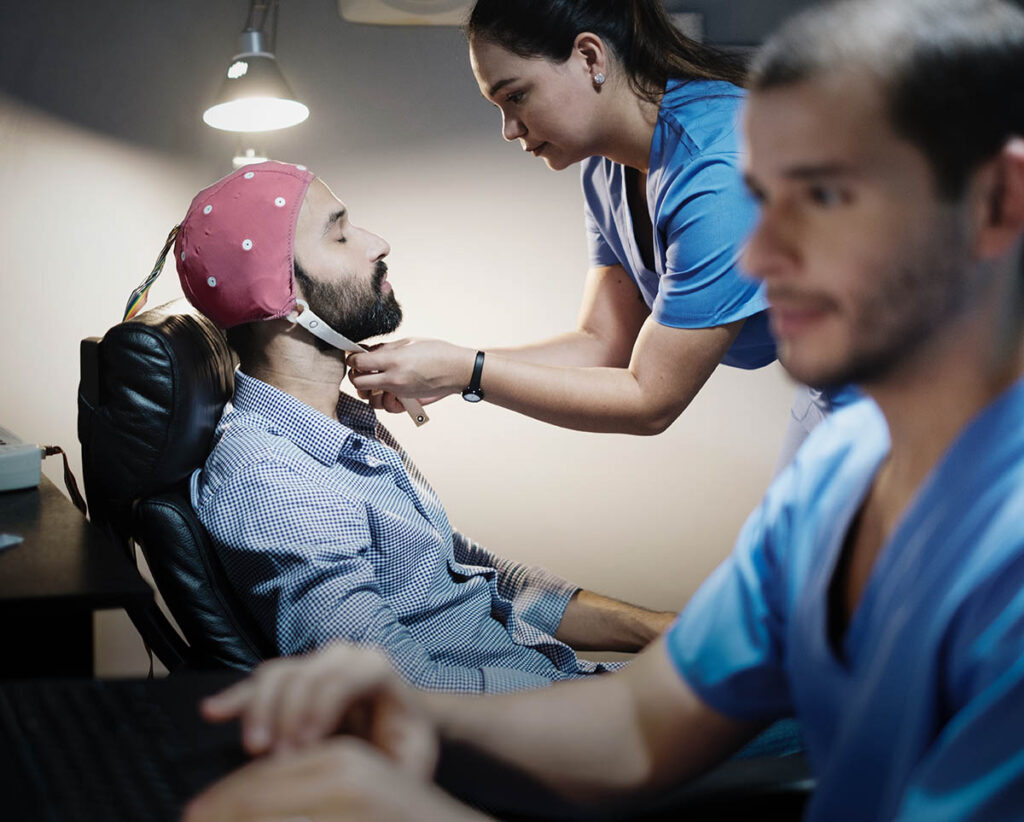When you have a mental health disorder, it can feel like you don’t fit into your own skin. While talk therapy can be critical in helping individuals get to the core of their issues, some people may benefit from alternative forms of treatment like neurofeedback therapy. Colorado Medication Assisted Recovery provides clients with the opportunity to try neurofeedback therapy in the hopes that it provides relief from the symptoms of various mental health disorders.
What Is Neurofeedback Therapy?
The use of neurofeedback therapy goes all the way back to the early 20th century. It’s a non-invasive procedure that monitors brainwaves using equipment like an electroencephalograph (EEG) to record the brain’s electrical activity. Therapists rely on this data to find irregularities in different areas of the brain and find ways to encourage more positive activity in the organ.
Neurofeedback therapy helps clients by teaching them techniques that help them regulate and boost brain functions. The treatment has proven helpful in providing relief from the symptoms that accompany mental health disorders like ADHD, anxiety, and insomnia.
How Is Neurofeedback Therapy Applied?
Your therapist may recommend that you try neurofeedback therapy if you are dealing with conditions like:
- Attention deficit disorders
- Birth trauma
- Depression
- Anxiety
- Insomnia
- PTSD
- Brain injuries
It’s considered safe to use neurofeedback therapy on children, adolescents, and adults. Clients dealing with issues tied to cognitive loss because of aging can also benefit from the treatment. Neurofeedback therapy can be used in combination with more traditional forms of therapy as part of a client’s treatment plan.
How Does Neurofeedback Therapy Work?
Most people attend neurofeedback therapy once per week, and sessions typically last between 30 and 60 minutes. The number of sessions you attend depends on the severity of your condition. While the average length of treatment tends to be 20 weeks, your therapist may recommend that you attend more sessions per week if they think you might benefit.
Sessions typically start with you having electrodes attached to your scalp that let the EEG machine read and measure your current brain activities in real-time. There are four brain wave types measured during a biofeedback therapy session:
- Beta waves — These brain waves move quickly at low amplitude. They measure alertness, arousal, and how much you are cognitively engaged.
- Alpha waves — Alpha waves move slower than beta waves at a higher amplitude. They help therapists read your brain’s level of mental coordination, learning, non-arousal, and the mind-body connection.
- Theta waves — Theta waves move slower than alpha waves at a higher amplitude. They show your brain’s memory levels, recognizing vivid imagery, subconscious information processing, and awareness of internal signals.
- Delta waves — Delta waves move the slowest of all brain waves at the highest amplitude. They produce information around your deep sleep, healing, and regeneration.
What Are the Benefits of Neurofeedback Therapy?
While neurofeedback therapy can’t cure mental health disorders, it can help regulate how your brain works to help it function more healthily. Neurofeedback therapy helps your central nervous system reorganize and control different brainwave frequencies. The sessions also help your therapist pinpoint specific places in your brain producing the symptoms of your neurological issues. That information helps them come up with more targeted treatment.
Colorado Medication Assisted Recovery believes in providing clients with every tool necessary to help them overcome their issues. Neurofeedback therapy can help clients find relief from the symptoms of a mental health disorder that may be holding them back in life.
Other treatments and programs offered at Colorado Medication Assisted Recovery include:
- Mental health treatment
- Cognitive-behavioral therapy
- Dialectical behavior therapy
- Group therapy
- Individual therapy
- Family therapy
You don’t have to continue living life the way you have. Contact Colorado Medication Assisted Recovery today at 833.448.0127 to get started on a new path.


















